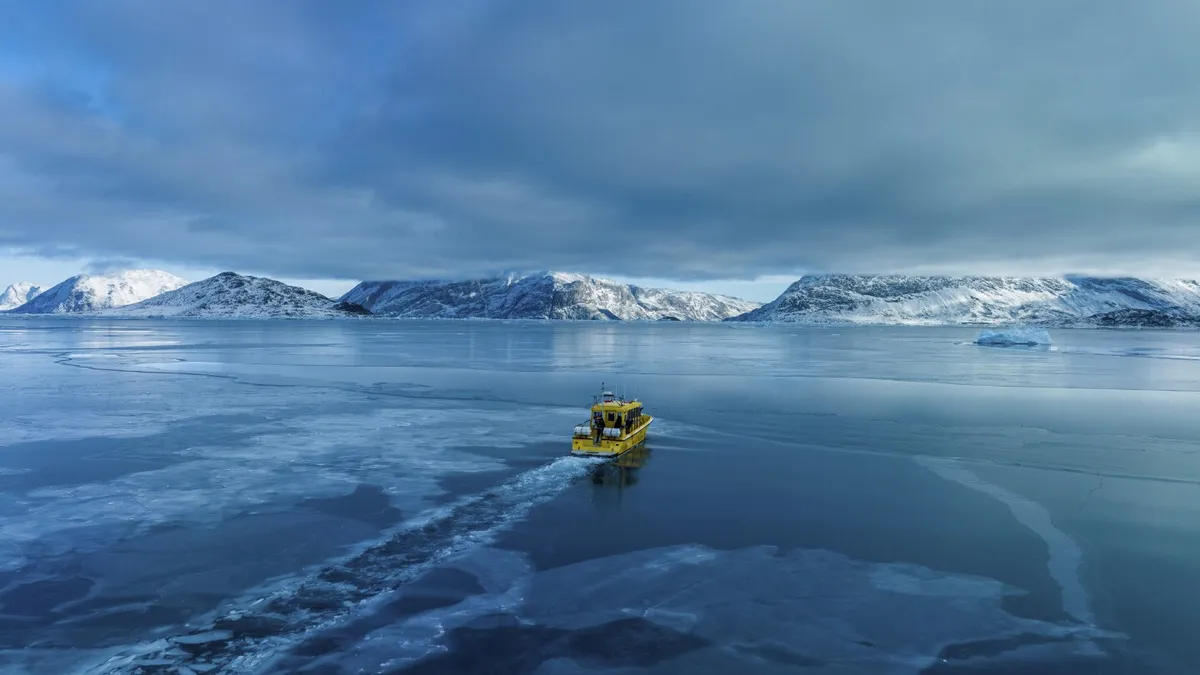
In the heart of Greenland, Lisa Sólrun Christiansen begins her day at 4 a.m., dedicating her time to knitting thick wool sweaters that have garnered international acclaim for their warmth and vibrant patterns rooted in Inuit culture. However, her morning routine has become increasingly disrupted by news surrounding former U.S. President Donald Trump's intentions regarding her beloved homeland. “I get overwhelmed,” Christiansen expressed as she gazed upon the stunning blue icebergs dotting the sea.
Christiansen, 57, is deeply connected to her heritage; her father, an artist and educator, played a pivotal role in designing the red-and-white Greenlandic flag. “On his deathbed, he spoke of the flag as the people’s symbol,” she shared, reflecting on her father's hope that it would unite the Greenlandic people.
As a self-governing region of Denmark, Greenlanders are increasingly anxious about their island becoming a pawn in the geopolitical struggles between the U.S., Russia, and China, especially as global warming opens new access to the Arctic. Many fear that Trump's ambitions to gain control over Greenland—known for its rich mineral deposits and strategic location—could hinder their aspirations for independence. This unease was amplified when U.S. Second Lady Usha Vance announced plans to visit Greenland for a national dogsled race, alongside visits from National Security Adviser Michael Waltz and Energy Secretary Chris Wright to a U.S. military base in the region.
The situation escalated when U.S. Vice President JD Vance declared his intentions to visit the Greenland military base, stating, “We want to reinvigorate the security of the people of Greenland because it’s important for the security of the entire world.” His comments reignited tensions following Trump's recent remarks about the possibility of annexing Greenland, just two days after the island held parliamentary elections that favored independence.
Local politicians reacted swiftly to the U.S. announcements, deeming them as aggressive displays of power during a sensitive time. Outgoing Prime Minister Múte Boroup Egede emphasized the need for respect towards Greenland’s integrity and democracy, asserting, “Our integrity and democracy must be respected without any external interference.”
Greenland has been part of Denmark since 1721 and has been on a path towards independence for decades. While there is broad support among Greenlanders for independence, opinions vary on the timeline and method for achieving it, with many unwilling to exchange one colonial power for another.
Experts argue that while Greenland has limited leverage against a superpower like the U.S., Trump’s approach has inadvertently united the Greenlandic people in their quest for self-determination. Otto Svendsen, an Arctic expert at the Center for Strategic and International Studies, noted that the pressure from Washington has fostered a sense of pride among Greenlanders, who are determined to make their voices heard.
Under the 2009 Greenland Self-Government Act, Denmark acknowledged Greenland’s right to independence at a time of its choosing, a principle echoed in the United Nations charter, which the U.S. endorsed in 1945. However, Trump's focus appears to be on U.S. economic and security interests rather than the rights of smaller nations.
Greenland, home to approximately 56,000 people, predominantly of Inuit descent, holds significant strategic value, particularly as melting ice in the Arctic intensifies competition for energy and mineral resources. The Pituffik Space Base plays a crucial role in missile warning and space surveillance operations for the U.S. and NATO. Many Greenlanders had hoped to leverage this unique geopolitical position to facilitate their independence, but now they fear it may leave them more vulnerable.
Cebastian Rosing, who operates a water taxi service in Nuuk, expressed frustration over Trump's intentions, stating, “It’s so weird to defend the idea that our country is our country because it’s always been our country.” He highlighted the ongoing cultural resurgence in Greenland as a reclamation of identity post-colonialism.
While Greenlanders generally appreciate their relationship with the U.S., their historical context is essential. The U.S. occupied Greenland during World War II, establishing several military bases, and after the war, President Harry Truman proposed purchasing the island, a suggestion rejected by Denmark. Trump’s recent revival of such proposals has been met with skepticism and resistance.
Despite his controversial stance, some Greenlanders, like Jørgen Boassen, have expressed admiration for Trump, arguing that the U.S. should play a role in ensuring Greenland’s security, given Denmark’s historical neglect. Yet, Boassen also advocates for Greenland’s independence, envisioning a relationship akin to the free-association agreement established by the Marshall Islands with the U.S. in 1986.
Ultimately, the consensus among Greenlanders is clear: the future of their island should rest in their hands, not dictated by external forces. “We have to stand together,” Christiansen reiterated, her knitting needles clicking in solidarity with her fellow countrymen as they navigate the complexities of their identity and autonomy in the face of geopolitical pressures.
This article is part of an ongoing Associated Press series supported by the Pulitzer Center for Crisis Reporting, focusing on the threats to democracy in Europe.